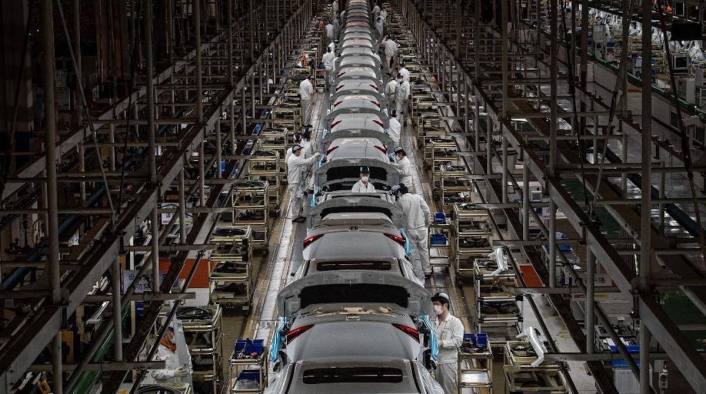China faces a triple whammy as it cranks up the economy amid the Covid-19 crisis.
Factory activity is proving sluggish, international trade is facing “greater challenges” and consumer spending is shrinking because of unemployment fears.
With vast regions of the planet still in lockdown, the omens are ominous.
On Thursday, crucial Chinese data about manufacturing activity illustrated the bumpy road to recovery.
Official numbers released by the National Bureau of Statistics showed that the Purchasing Managers’ Index in April came in at 50.8 compared to 52.0 last month, which was down from analysts’ forecasts. A figure above 50 separates expansion from contraction.
“The spread of the pandemic is accelerating overseas, and global economic activity has contracted sharply,” Zhao Qinghe, a senior statistician at the NBS, said in a statement.
“[With] insufficient orders, China’s foreign trade faces greater challenges,” Zhao added.
Another survey published just hours later painted an even gloomier picture.
The Caixin/Markit PMI tends to feature a mix of small- and medium-sized companies compared to the National Bureau of Statistics poll, which concentrates on big businesses and state-owned enterprises.
‘Sharp fall’
For April, it contracted sharply to 49.4 compared to 50.1 last month. But it was still above February’s reading of 40.3, the steepest drop on record.
“The sharp fall in export orders seriously hindered China’s economic recovery in April, although businesses were gradually getting back to work,” Zhong Zhengsheng, the director of macroeconomic analysis at the CEBM Group, said in a note accompanying the Caixin/Markit survey.
“Amid the second shockwave from the pandemic, the problems of low business confidence, shrinking employment and large inventories of industrial raw materials became more serious. A package of macroeconomic policies, as suggested in the April 17 Politburo meeting, must be implemented urgently,” Zhong added.
Indeed, these are unprecedented times. So far, more than 3.2 million people have been infected globally by Covid-19 with the death toll edging past 228,000.
Earlier this week, a study released by the People’s Bank of China gave a snapshot of household sentiment. Compiled in the first quarter, the PBOC polled 20,000 bank customers in 50 cities across the country.
Slightly more than 53% of those interviewed revealed that they would be saving more because of concerns about a virus “second-wave” and a deteriorating employment outlook.
A similar story has been reported in the United States and Europe as economies across the globe struggle with the Covid-19 catastrophe, threatening lives and livelihoods.
In China, this could lead to deflationary pressure and force Beijing to increase stimulus measures.
“We have already seen reports of China’s factories laying off workers due to foreign buyers withdrawing orders. Factories’ profits will fall throughout the supply chain in China. This will hit employment and wages and therefore domestic demand,” Iris Pang, the chief economist for Greater China at ING, the multinational bank, said in a note.
“Global demand is likely to remain weak due to high unemployment rates in major economies. China’s export orders from the rest of the world should be smaller on both a quarter-on-quarter as well as a year-on-year basis. This is confirmed by the very bad new export orders sub-index of the [official] manufacturing PMI at 33.5,” she added.
Read: Virus vaccine could be ready by September
Read: Wolf warriors, Twitter trolls and China’s virus ‘lies’
Read: How China hid ‘tens of thousands’ of virus deaths
President Xi Jinping’s government is particularly concerned about struggling small- and medium-sized companies. They have borne the brunt of the pandemic and many are still in intensive care.
Creating 60% of China’s GDP growth, the private sector accounts for around 80% of urban jobs and includes legions of SMEs.
“Public records suggest that at least half a million firms [in China] were dissolved in the first quarter and more are likely to close shop,” Mark Williams, the chief Asia economist at Capital Economics, said in a report earlier this month.
In turn, this will heighten anxiety about job security in the world’s second-largest economy.
Last week, a report released by The Economist Intelligence Unit predicted that urban unemployment, excluding 290 million migrant workers, would reach 10% this year compared to 3.6% in 2019.
“We estimate at least an additional 22 million urban workers will lose their jobs in 2020, pushing up the unemployment rate to around 10%. A further 250 million could experience wage cuts in the range of 10 [to] 50%,” the EIU said.
But that might be on the conservative side. UBS Securities reported that up to 80 million jobs have been lost in the service sector, industry and construction. “China’s labor market pressure may be the most challenging since the late 1990s and early 2000s,” it said.
Now, that is a chilling thought.
This report first appeared on Asia Times
























